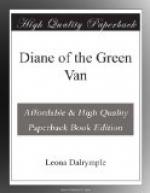“Theodomir! Theodomir!” he cried.
Tregar turned away from the sound of his terrible sobbing.
CHAPTER LIV
ON THE WESTFALL LAKE
Hurrying clouds curtained the silver shield of a full moon and found themselves fringed gloriously with ragged light. It was a lake of white, whispering ghosts locking spectral branches in the wind, of slumbering lilies rustled by the drift of a boat; a lake of checkered lights and shadows fitfully mirroring stars at the mercy of the moon-flecked clouds. On the western shore of the wide, wind-ruffled sheet of water, on a wooded knoll, glimmered the lights of the village.
To Diane, stretched comfortably upon the cushions of the boat, which had drifted idly about since early twilight, the night’s sounds were indescribably peaceful. The lap and purl of water, the rustle of birch, the call of an owl in the forest, the noise of frog and tree toad and innumerable crickets, they were all, paradoxically enough, the wildwood sounds of silence.
With a sigh the girl presently paddled in to shore. As she moored her boat, the moon swept majestically from the clouds and shone full upon a second boatman paddling briskly by the lily beds. The boat came on with a musical swirl of water; the bareheaded boatman waved his hand lazily to the girl standing motionless upon the moonlit wharf, and as lazily floated in.
“Hello!” he called cheerfully.
The moon, doomed to erotic service, was again upon the head of Mr. Poynter.
“It’s the milkman’s boat!” explained Philip smiling. “He’s a mighty decent chap.”
Diane’s face was as pale as a lily.
“How did you know?” she asked, but her eyes, for Philip, were welcome enough.
“I saw Carl,” said he, dexterously rounding to a point at her feet. “He told me.”
He lazily rocked the boat, met her troubled glance with frank serenity and said with his eyes what for the moment his laughing lips withheld.
“Come, row about a bit,” he said gently. “There’s a lot to tell—”
“The other candlestick?”
“That,” said Philip as he helped her in, “and more.”
The boat shot forth into the moonlit water.
“And your father, Philip?”
“Better,” said Philip and feathered his oars conspicuously in a moment of constraint. Then flushing slightly, he met her glance with his usual frank directness. “Dad and I had quarreled, Diane,” he said quietly, “and he was fretting. And now, though the fundamental cause of grievance still remains, we’re better friends. Ames, the doctor, said that helped a lot.” He was silent. “A dash of Spanish,” he began thoughtfully, “a dash of Indian, and the blood of the old southern cavaliers—it’s a ripping combination for loveliness, Diane!”
Not quite so pale, Diane glanced demurely at the moon.




